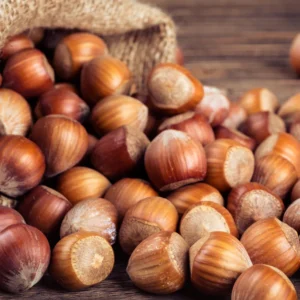You may think of walnuts as a dessert ingredient in cookies, muffins, brownies, and baklava. But walnuts are also perfect for snacking or a topping for salads, cooked veggies, whole grains, and hummus. In addition to their crunch, walnuts deliver essential nutrients and offer science-backed health benefits. Walnut are a great source of important nutrients and healthy fats. They have also been linked to beneficial effects on heart and gut health, blood pressure, and even male fertility. Even better, these nutritional powerhouses can keep your brain functioning well as you age and are also able to suppress cancer growth.
Here are some of the top perks of this healthy tree nut.
Walnut Are Rich in Nutrients
One ounce (about a quarter cup, or 14 walnut halves) provides 18 grams of good fat, 4 grams of protein, and almost 2 grams of fiber, according to the United States Department of Agriculture’s bulletin Nutritive Value of Foods. The same amount of walnuts also gives you nearly 50% of the daily target for manganese. (The National Institutes of Health Office of Dietary Supplements recommends 1.8 mg of manganese a day for females and 2.3 for males, and one ounce of walnuts has 0.97 mg of manganese, according to the University of Rochester Medical Center.) One ounce of walnuts also gives you other nutrients, including magnesium, potassium, iron, calcium, sodium, and B vitamins.
A 2018 study published in the International Journal of Environmental Research and Public Health identified even more micro-elements and trace elements in walnuts. In order of descending content after magnesium and iron, they are zinc, boron, molybdenum, copper, nickel, cobalt, and others with even smaller concentrations.
According to MedlinePlus, the macrominerals you want to focus on are calcium, phosphorus, magnesium, sodium, potassium, chloride, and sulfur. Walnuts check the box on four of these macrominerals. Plus, they contain some trace minerals such as iron, manganese, copper, zinc, and cobalt.
Manganese is a mineral that supports healthy bones and is needed for collagen production and wound healing. Walnuts are also packed with polyphenols, mainly pedunculagin, according to a 2017 article published in Critical Reviews in Food Science and Nutrition. Pedunculagin is an ellagitannin with antioxidant and anti-inflammatory effects, helping protect against the initiation and progression of cancer, heart disease, and neurodegenerative diseases.
The walnuts discussed so far are common walnuts, or English walnuts. But even the phenolic compounds in black walnuts have anticancer and antioxidant effects, as was reported in the journal Molecules in 2020.
They Deliver Healthy Fats
Some fats are healthier than others. Among the healthy kinds are monounsaturated fat and polyunsaturated fat. Walnuts are one of the top foods you can eat as a source of that good polyunsaturated fat, according to MedlinePlus.
Alpha-linolenic acid, or ALA, is a type of omega-3 fatty acid known to reduce inflammation. Walnuts are a major source of ALA. A 2020 study, published in the journal Nutrients, assessed the effects of walnut consumption on the omega-3 fatty acid profile of healthy adults over a four-week period. Researchers found that after a month of consuming a few ounces of walnuts daily, the subjects’ omega-3 status improved. They also experienced reductions in body weight and body fat, plus gains in lean body mass and body water.
Increasing the amount of ALA in your diet is associated with a 10% lower risk of cardiovascular disease, according to a 2022 article published in Advances in Nutrition. And the same article reported that ALA can also lower total cholesterol, LDL cholesterol, triglycerides, and blood pressure and can have positive effects on other diseases, like diabetes.
Walnuts Can Help Gut and Heart Health
The bioactive compounds in walnuts may play an important role in altering the gut environment in ways that impact disease outcomes, say researchers. In a six-week Penn State study of overweight adults with cardiovascular risk published in The Journal of Nutrition in 2020, the addition of walnuts to their diet enhanced beneficial gut bacteria linked to health benefits, including reduced blood pressure and total cholesterol.
There is other evidence that walnuts are beneficial for the heart. Another article published in The Journal of Nutrition in 2014 cited several ways in which walnuts help reduce risk factors for cardiovascular disease. Two of these major risk factors are high low density lipoprotein (LDL, or the “bad”) cholesterol and high blood pressure—and walnuts help decrease both of these. The article also identified other areas in which walnuts can be beneficial to heart health, such as by improving how the lining of your heart and blood vessels (the endothelium) functions and by decreasing inflammatory markers and oxidative stress, which occurs when free radicals get the upper hand over antioxidants.
They Help Reduce Blood Pressure
The above study was not the only one to find that walnuts can lower blood pressure. In a 2019 study, published in Journal of the American Heart Association, researchers found that when study subjects ate whole walnuts, they experienced greater benefits than when they consumed a diet with a similar fatty acid profile without walnuts. Outcomes included a reduction in central diastolic blood pressure (the pressure that moves towards the heart), and positive changes to cholesterol profiles. Scientists say the study is an example of how a relatively small eating change can result in significant cardiovascular benefits.
They Can Benefit Brain Health
Eating walnuts may help slow cognitive decline in at-risk groups of older adults, according to a 2020 study published in The American Journal of Clinical Nutrition. Researchers randomly assigned over 600 elder adults to either a diet with 15% of calories from walnuts or a control diet without walnuts. While the walnuts did not affect the cognitive function of healthy subjects, brain MRIs showed that the nuts had a greater effect on higher-risk people, including heavier smokers and those with lower baseline neuropsychological test scores.
And not only do those polyphenolic compounds in walnuts reduce oxidants and inflammation in brain cells, but they also can help you form new brain cells and increase signaling between brain cells, according to a 2014 study published in The Journal of Nutrition.
Walnut can influence the brain in other ways as well. A 2020 review published in Current Pharmaceutical Design reported that walnuts have also shown promising results in improving memory. And this review also suggests that the various fats, proteins, fibers, minerals, and trace elements in nuts work synergistically, meaning they work together to create these effects.
Walnuts Offer Cancer Protection
Building on previous animal studies, researchers assessed the effects of breast cancer growth in cisgender females in a 2019 study published in Nutrition Research. In the trial, cisgender females with breast lumps were randomly assigned to consume either two ounces of walnuts per day or no walnuts for two to three weeks before surgery. Initial biopsy samples were compared to those obtained when the lumps were removed. Scientists found that walnut consumption altered the expression of over 450 genes in the tumors in ways that could suppress cancer growth and improve survival outcomes.
Walnuts also contain many other potential antitumor compounds, and consistently eating walnuts can produce anticancer effects, according to a study published in Toxins in 2018. While more research is needed in this area, the results are promising.
Black walnuts can also be a source of bioactive compounds with an anti-cancer effect. The findings of a 2020 study published in Molecules support the anticancer activities black walnuts may have. These effects are attributed to the phenolic compounds in black walnuts.
They Play a Role in Weight Regulation
In a small trial published in the journal Diabetes Obesity and Metabolism in 2017, subjects were given smoothies that either contained walnuts or no walnuts for five days while living in a controlled clinical research center. The addition of walnuts decreased feelings of hunger and improved appetite regulation. Researchers say the impact of walnuts on satiety could be due to changes to the central nervous system that affect food cues. The shift could help curb obesity risk.
These findings were echoed in another study. A randomized controlled trial published in Nutrition Research in 2019 that studied black walnuts and English walnuts found that both types of walnuts were better at suppressing appetite than the control. It also showed that black walnuts made subjects feel more full than either English walnuts or the control. So if you’re looking to satiate your appetite and feel full at the same time, snack on black walnuts over the English variety.
Walnut Can Improve Sperm Vitality
A clinical trial of 119 participants that analyzed the effects of nut consumption on sexual function in healthy cisgender males was published in the journal Nutrients in 2019. The researchers found that over 14 weeks, males who ate about two servings (two ounces) of a nut mixture daily as part of a Western-style diet experienced a significant increase in orgasmic function and sexual desire. The mixture comprised 50% walnuts, 25% almonds, and 25% hazelnuts.
The effect of walnuts on the quality of semen was assessed in a study published in Biology of Reproduction in 2012. Of the 117 participants in this study, the ones who ate walnuts saw an improvement in sperm vitality (the percentage of live sperm in a sample), motility (the ability of sperm to move), and morphology (the structure and form of sperm) compared to participants who continued eating a Western-style diet without nuts.
More Ways To Enjoy Walnut
After reading about the various health benefits of this all-rounder, you may be wondering how to incorporate more walnuts into your diet. The good news is that walnuts pair well with a wide variety of foods, from sweet to salty. Here are some suggestions for bringing these tree nuts to your table.
For a healthy snack, pair walnuts with fresh fruit, dip them into melted dark chocolate or incorporate them into energy balls. Add walnuts to smoothies or overnight oats at breakfast, sprinkle them onto black bean or lentil soup at lunch, and include them in recipes like veggie tacos and stir-fries at dinner.
You can also whip up a simple walnut pesto made from walnuts, pureed with extra virgin olive oil, basil, garlic, salt, and pepper. Drizzle it over roasted veggies, toss it with zucchini spirals, or use it as a creamy, flavorful salad dressing.











